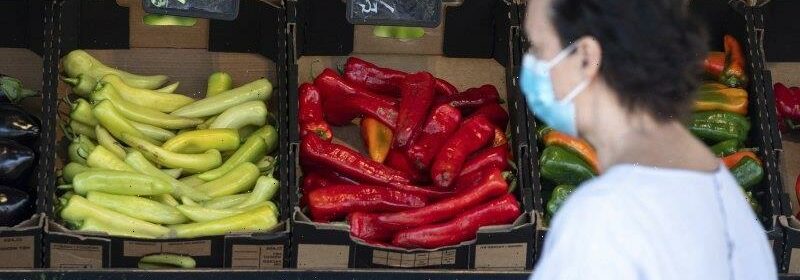Consumer spending starts to dry up as interest rates rise

Fewer movie tickets or nights out are in the budgets of Australian households as higher interest rates start taking bigger chunks out of their pay cheques and inflation adds to the cost of essential goods including groceries and petrol.
Data from some of Australia’s largest financial institutions shows spending on discretionary items including household products, entertainment and dining out has begun to fall as both inflation and interest rates continue to rise.
Consumers continue to spend more on essentials including groceries and petrol as prices rise.Credit:Penny Stephens
On Wednesday, Australian Bureau of Statistics data will show just how high inflation has become, and Treasurer Jim Chalmers will on Thursday address the ongoing cost of living pressures being faced by households around the country when he delivers his economic statement to parliament.
Commonwealth Bank senior economist Belinda Allen said people had spent up big after the pandemic’s Delta lockdowns of 2021 and through the Omicron outbreak earlier this year, but that looked to have peaked around mid-May, just after the Reserve Bank started lifting interest rates for the first time in more than a decade.
“The categories where we’ve seen the largest moderation are the consumer discretionary categories, particularly eating out, recreation, general retail,” she said. Those categories include spending on entertainment, as well as in large department stores including David Jones and Kmart.
Spending on clothing has remained fairly strong, she said, as people continue to update their post-lockdown wardrobes, but household goods spending was also easing despite being one of the strongest categories during the first two years of the pandemic.
Where the bank was not seeing a slowdown in spending was for essentials, including food, energy and transport.
“There is this real divergence between discretionary retail and essential retail at the moment,” she said.
While the latest inflation figures are yet to be published, Allen said the most recent data showed inflation in essentials including food and fuel was running at twice the rate of non-essentials.
“That makes consumers feel the pain a bit more,” she said.
NAB’s consumer tracking also shows a decline in consumer spending. Chief economist Alan Oster said the bank’s economists had wondered how long the “gravity-defying trend” of high consumer spending through to the end of the financial year could continue.
“While the new financial year has seen lower spending, the trend shows a very moderate decline,” he said. “However, rising rates, high inflation and weaker confidence are still likely to eat into nominal consumer spending in the back half of this year.”
Both banks expect inflation to lift about 6 per cent next week. So far, the Reserve Bank has lifted interest rates by 1.25 percentage points and is expected to lift the official cash rate to at least 1.85 per cent at its next meeting in August.
Because Commonwealth’s data tracks money spent, Allen said the actual volume of goods people are purchasing has likely fallen further.
“People are actually just buying less because of price rises and also interest rate hikes as well,” she said.
Spending is still up higher than it was a year ago, according to separate card data from the Australian Retailers Association. Card data gathered for the association by Mastercard showed total retail sales were up 11 per cent over the 12 months to June, driven by big increases in fuel and convenience spending (up 23 per cent), and large bumps in jewellery purchasing (23 per cent) and accommodation (18 per cent).
But the association’s chief executive Paul Zahra said the rosy numbers were not a completely accurate reflection of retail performance.
“We’re operating in an inflationary landscape, where consumer prices are increasing, which impacts overall retail trade numbers, so naturally – sales will be elevated,” he said.
Business costs have also been rising, Zahra said, and increases in fuel, labour, energy and rent costs were affecting employers.
“We remain optimistic the retail sector will be able to weather the current economic headwinds and the rising cost challenges,” he said. “However, we need to acknowledge that just because overall sales are up, it does not necessarily mean that retailers are doing well.”
The bank economists said slowing consumer spending was a good thing.
“To control inflation, to bring demand back more in line with supply, you do need consumer spending to slow, so we are seeing that take place,” Allen said. “The uncertainty is how much will it slow? That’s the big question.”
Most Viewed in Politics
From our partners
Source: Read Full Article
